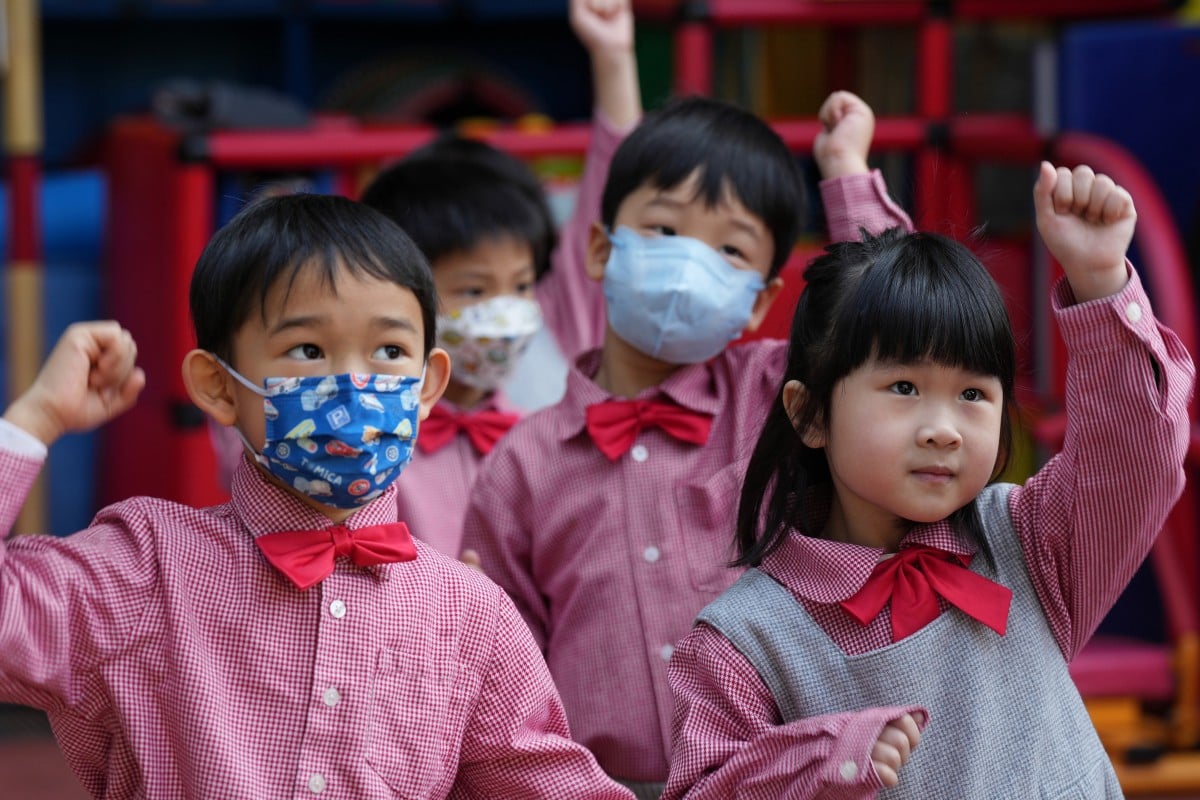
Your Voice: Hong Kong axed its mask mandate, but don’t judge those who keep them on; AI can help schools (short letters)
- Covid-19 pandemic made it necessary to wear masks for three years, and many people may still be too anxious to remove them, one student writes
- Another shares the benefits of ChatGPT and how it can be used in education
 Students had their first mask-free school day in almost three years, but some children – and parents – aren’t ready to take them off just yet. Photo: Elson Li
Students had their first mask-free school day in almost three years, but some children – and parents – aren’t ready to take them off just yet. Photo: Elson LiHave something to say? Send us a letter using this Google form.
Our faces should not be judged
Audrey Tsang, Tsuen Wan Public Ho Chuen Yiu Memorial College
The pandemic has made wearing a mask a necessity for three years, and people have become accustomed to it. However, after the recent cancellation of the mask mandate, many are not yet ready to take off their masks in public.
Surveys show that this fear is particularly prominent among secondary school students, as they worry about how they may be perceived without a mask. Many adults report similar anxieties, while others are apprehensive about being judged by others when they are seen without one.
This issue of appearance anxiety is becoming more prevalent. People are afraid of being judged on their looks. This can lead to cyberbullying, with keyboard warriors attacking people who post their faces online.
Many of us have grown used to masks and have forgotten what other people look like. The habit of imagining what someone looks like can lead to fear of not meeting others’ expectations when masks are removed. I believe that even after the cancellation of the mask mandate, most people will continue to wear a mask.
AI can help us in many ways
Christy Zhou, King Ling College
In November, the introduction of ChatGPT sparked considerable debate regarding its potential advantages and disadvantages for education. Some of the concerns include possible issues with plagiarism and academic dishonesty, as students could potentially use the chatbot to write their essays.
However, ChatGPT can also provide numerous benefits for educators and students alike. It can provide us with a real-time platform to share information and ideas, answer questions, provide stimulating classroom activities, help students understand complex concepts, and serve as an AI assistant for teachers.
Should ChatGPT be allowed in school?
Secondly, ChatGPT can be used for student assessment and to generate homework, tests and exams, helping teachers to evaluate students and monitor their progress.
Lastly, ChatGPT can provide rich explanations, methods, information and ideas, aiding students in understanding concepts more deeply and creatively, improving learning efficiency and engagement, and ultimately helping them to achieve autonomous and personalised learning.
We should not only focus on the potential disadvantages of ChatGPT, but consider its numerous advantages as well.
Don’t miss out on real life
Cynthia Chim Tin-wing, St Paul’s Secondary School
Recent reports say that children and teenagers in mainland China will be limited to three hours of video games per week. While this could be effective in controlling screen time, I believe that three hours per week is too restrictive.
Instead, a maximum of three hours a day should be permitted for the recreational use of electronic devices, excluding educational purposes. This is especially true in Hong Kong where 99 per cent of children spend more time on their devices than with family and friends, and teenagers average seven to eight hours of phone usage per day. Reducing this to three hours a day could be beneficial for all.
Reducing phone usage can lead to improved communication skills, a larger social circle, and better physical health. Too much screen time can damage eyesight, cause back pain and headaches, and a lack of exercise can lead to obesity.
Before phones, kids would more often be engaging in outdoor activities such as hiking, cycling and camping. Now, they can become too absorbed in the virtual world, missing out on the richness of life. Parents should talk to their children to strengthen the parent-child bond, encourage outdoor activities and set boundaries by limiting screen time.
A good deed is never lost
Natalie Kwok Wing-yiu, St Paul’s Secondary School
Saint Basil said: “A tree is known by its fruit; a man by his deeds. A good deed is never lost; he who sows courtesy reaps friendship, and he who plants kindness gathers love.” These words were passed down to me by my mother, who believed that performing a good deed would always have a positive impact.
Even small acts of kindness can have a lasting effect, and no good deed ever goes unnoticed. Her wisdom has been proven true. I have seen how an act of kindness can make a lasting difference in someone’s life.
In February, I visited a senior care centre. An elderly man, suffering from cognitive impairment, had the incorrect belief that his son was still alive and was coming to visit.
Rather than force him to accept the truth, his family responded with compassion by going for a walk with him and staying by his side. When he became agitated, they would acknowledge his emotions, and once he had calmed down, they used a gentle voice to remind him of the truth. Doing “good deeds” is not only about material things, but often about being present for those you care about.
